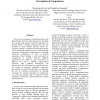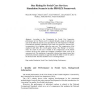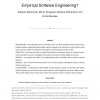657 search results - page 8 / 132 » Same technology, different outcome |
ICALT
2007
IEEE
14 years 2 months ago
2007
IEEE
Over the years competence-based approaches in the field of formal and non-formal education are becoming more common and appear to offer the opportunity to develop flexible e-train...
CHI
2010
ACM
14 years 2 months ago
2010
ACM
How can we best explore the range of users' reactions when developing future technologies that maybe controversial, such as personal healthcare systems? Our approach – Cont...
ECTEL
2007
Springer
14 years 1 months ago
2007
Springer
According to the Commission for Social Care Inspection, performance in Care Homes can be evaluated through a range of indicators in each of the different outcome areas specified by...
TSE
2010
13 years 6 months ago
2010
BACKGROUND – the systematic review is becoming a more commonly employed research instrument in empirical software engineering. Before undue reliance is placed on the outcomes of...
ICCD
1992
IEEE
13 years 12 months ago
1992
IEEE
Asynchronous or self-timed systems that do not rely on a global clock to keep system components synchronized can offer significant advantages over traditional clocked circuits in ...



